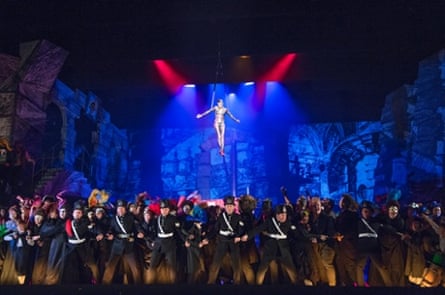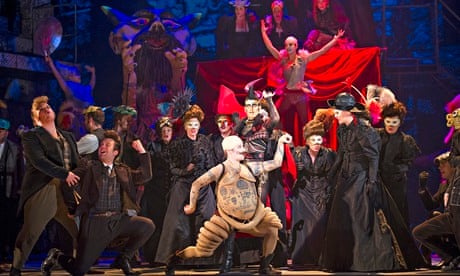It was English National Opera that encouraged Terry Gilliam to try his hand at directing opera when he staged Berlioz's The Damnation of Faust at the Coliseum three years ago. Both Gilliam and ENO must have enjoyed the collaboration for the director has returned to tackle more Berlioz there, taking on the much more difficult challenge of Benvenuto Cellini.
Cellini was Berlioz's first attempt at an opera, and the piece went through several different versions before it was eventually seen in Paris in 1838.
What started out as an opera comique with spoken dialogue, based on the Renaissance artist's racy autobiography, eventually became an opera semiseria in which the story of Cellini's exploits and the casting of his great statue of Perseus with the head of Medusa is switched from Florence to Rome, and much of the incidental detail is entirely invented.
It remains an awkward hybrid – by no means a comic opera, but no means an entirely serious one either, though its central preoccupation with artistic creativity and the role of the artist in his society is unmistakable.

There's much first-rate music in the score, but also moments when the invention flags and the dramatic pace falters, and even with the explosion of interest in Berlioz over the past half a century, fully staged productions have remained rarities; the last one in this country was at Covent Garden more than 40 years ago.
Gilliam's production goes at this baggy piece with tremendous gusto. The set designs, originally conceived by Rae Smith, reference Piranesi's atmospheric etchings; the costumes by Katrina Lindsay are a cheerful century-hopping mix, centred around the time the work was composed.
The action spills exuberantly into the audience before the overture has even finished, with the first outing for a troupe of actors, tumblers and stilt walkers who ensure that Gilliam always has the resources he needs to create galleries of arresting grotesques and vaguely anarchic images.

Not everything he does comes off. There are moments when the original dramaturgy is just impossible to remedy, and others that you sense he has treated just a little too respectfully, when his production seems a bit self-consciously semi-serious rather than semi-comic. But the sheer energy and generous humour of the show are hard to resist, like the arrival of Pope Clement VII (Willard White) in the second act almost like a deus ex machina on a vast wheeled throne, while flanked by a distinctly camp retinue of Swiss guard.
There are almost as many problems to solve musically as there are dramatically, and Edward Gardner does a hugely impressive job in keeping the momentum of the score going, giving the orchestral music real swagger and bite, and getting singing of tremendous commitment out of the ENO chorus.
The title role is notoriously hard to cast; it requires a tenor with power, stamina and a prodigious range, and Michael Spyres does a heroic job in sustaining it right through to the final climactic scene in which the bronze sculpture is cast. There are similarly accomplished performances from Paula Murrihy in the trousers role of his "business manager" Ascanio, Corinne Winters as Teresa, the woman Cellini loves, and Nicholas Pallesen as his rival in art and in love, Fieramosca.
No staging of Benvenuto Cellini is ever going to be 100% convincing, musically and dramatically, but between them Gilliam and Gardner have got an impressive amount of this one right.
In rep until 27 June and broadcast live to UK cinemas on 17 June. Box office: 020 7845 9300.
See also
'We have a big head problem': Terry Gilliam's opera diary
Gilliam's production in pictures



Comments (…)
Sign in or create your Guardian account to join the discussion